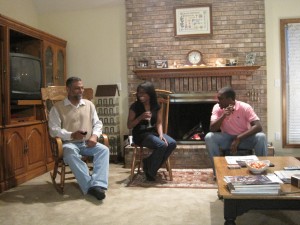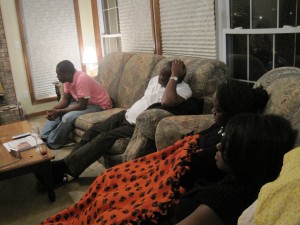 One day very soon, I am convinced, I will write a post on this blog that might begin with words like “tttoooeddydyy isssss teiehehe ffirissttt ddyofff snoeoow”, which would only mean that I was cold, freezing and shivering enough not to be able to edit simple sentences. I am convinced that that day is very, very soon. In fact sooner than I expect. Yesterday was my coldest night ever in Edwardsville and it reached -3degrees by my blog temperature meter, and 30degrees Fahrenheit. Even my bed now is too cold for comfort. Very soon I won’t have to go out to feel cold, and I am not looking forward to that.
One day very soon, I am convinced, I will write a post on this blog that might begin with words like “tttoooeddydyy isssss teiehehe ffirissttt ddyofff snoeoow”, which would only mean that I was cold, freezing and shivering enough not to be able to edit simple sentences. I am convinced that that day is very, very soon. In fact sooner than I expect. Yesterday was my coldest night ever in Edwardsville and it reached -3degrees by my blog temperature meter, and 30degrees Fahrenheit. Even my bed now is too cold for comfort. Very soon I won’t have to go out to feel cold, and I am not looking forward to that.
 Meanwhile, I’ve just returned from another day of feasting – probably my last of the Turkey Genocide season. This time, to the house of my “official” host family: the Indian father and the American mother. The special attraction was another visiting family from Chicago, who were originally from Nigeria. It had a father, let’s call him Dr. O, his wife, and two kids who would not speak Yoruba to me however I tried to make them. They were born in Nigeria but have lived in the States for a long time that they have become Americanized in dressing, speech and conviction in a way that could have been bad if it had hampered their cultural awareness. Apparently it hadn’t, and although they would rather not communicate in the language, they had a kind of cultural awareness that could only have resulted from good upbringing and appropriate socialization. To them, I must however have been a special kind of attraction as someone sent specifically from the home country to teach Americans the language. But if that was the case, I didn’t notice it. It was mostly a gathering of laughter, wine, food, and practical jokes. The first born of the Dr. Os is married to a beautiful American girl who was also present, and who I am discovering to be a masters student of my University as well.
Meanwhile, I’ve just returned from another day of feasting – probably my last of the Turkey Genocide season. This time, to the house of my “official” host family: the Indian father and the American mother. The special attraction was another visiting family from Chicago, who were originally from Nigeria. It had a father, let’s call him Dr. O, his wife, and two kids who would not speak Yoruba to me however I tried to make them. They were born in Nigeria but have lived in the States for a long time that they have become Americanized in dressing, speech and conviction in a way that could have been bad if it had hampered their cultural awareness. Apparently it hadn’t, and although they would rather not communicate in the language, they had a kind of cultural awareness that could only have resulted from good upbringing and appropriate socialization. To them, I must however have been a special kind of attraction as someone sent specifically from the home country to teach Americans the language. But if that was the case, I didn’t notice it. It was mostly a gathering of laughter, wine, food, and practical jokes. The first born of the Dr. Os is married to a beautiful American girl who was also present, and who I am discovering to be a masters student of my University as well.
 In gatherings like this, I am almost always bringing back the topic of language and awareness, and here’s how Dr. A, my Indian host rationalized it from his reading in German, Indian, Irish, French, and African migrations to the United States: First generation immigrants usually speak and understand the language, being a product of the two cultural experiences, and usually try to pass it along to their children. Their children – the second generation with little connection to the cultural experience of the homeland beyond their parents’ teaching usually become rebellious and toss out the language and cultural ideas of their immigrant parents while opting for the American way of life. It is the third generation however – without any link whatsoever to their original culture and language, according to him – who make the most effort to reconnect with their grandparents’ cultural base. This, obviously, is because they are usually the ones without an anchor. They most experience the feeling of homelessness and limbo, and usually find themselves going back in research to connect with what they feel most deprived of. According to this theory, it is only a most natural process when children of first generation immigrants try to become “Americanized”. And everything made sense to me.
In gatherings like this, I am almost always bringing back the topic of language and awareness, and here’s how Dr. A, my Indian host rationalized it from his reading in German, Indian, Irish, French, and African migrations to the United States: First generation immigrants usually speak and understand the language, being a product of the two cultural experiences, and usually try to pass it along to their children. Their children – the second generation with little connection to the cultural experience of the homeland beyond their parents’ teaching usually become rebellious and toss out the language and cultural ideas of their immigrant parents while opting for the American way of life. It is the third generation however – without any link whatsoever to their original culture and language, according to him – who make the most effort to reconnect with their grandparents’ cultural base. This, obviously, is because they are usually the ones without an anchor. They most experience the feeling of homelessness and limbo, and usually find themselves going back in research to connect with what they feel most deprived of. According to this theory, it is only a most natural process when children of first generation immigrants try to become “Americanized”. And everything made sense to me.
 However, contrary to the seriousness of this last discussion which actually took place in the car drive back from his house, the atmosphere of the get-together was one more of conviviality, guitar playing, joking and generally fooling around. It was like one of those old times of my upbringing when I sat around my siblings on an idle night after a game of cards, just tossing around all the craziest ideas in the world, laughing, arguing and generally being silly. I bring it up here because now that I think about it, I suddenly miss those times when all that mattered was who had the silliest ideas, and we would stay up all night singing, scrawling on the wall, or decorating the house for Christmas with little coloured paper decorations cut out and sealed with pap syrup and stretched across the house ceiling sometimes with multicoloured Christmas lights. It is usually towards this time of the year as well when we begin to learn new Christmas songs or make a fool out of the old ones, all the time trying to be careful not to make too much noise that could get us the beating of our lives. Oh the times we had. Tonight, I’m convinced that we could never get back that memorable childhood in the same old form we enjoyed it, but I look forward to a grown-up future recreation of those experiences, this time along with nieces and nephews, and a bigger happier family. Some day soon folks…
However, contrary to the seriousness of this last discussion which actually took place in the car drive back from his house, the atmosphere of the get-together was one more of conviviality, guitar playing, joking and generally fooling around. It was like one of those old times of my upbringing when I sat around my siblings on an idle night after a game of cards, just tossing around all the craziest ideas in the world, laughing, arguing and generally being silly. I bring it up here because now that I think about it, I suddenly miss those times when all that mattered was who had the silliest ideas, and we would stay up all night singing, scrawling on the wall, or decorating the house for Christmas with little coloured paper decorations cut out and sealed with pap syrup and stretched across the house ceiling sometimes with multicoloured Christmas lights. It is usually towards this time of the year as well when we begin to learn new Christmas songs or make a fool out of the old ones, all the time trying to be careful not to make too much noise that could get us the beating of our lives. Oh the times we had. Tonight, I’m convinced that we could never get back that memorable childhood in the same old form we enjoyed it, but I look forward to a grown-up future recreation of those experiences, this time along with nieces and nephews, and a bigger happier family. Some day soon folks…
4 Comments to The Cold Network & Other Stories so far. (RSS Feeds for comments in this post)